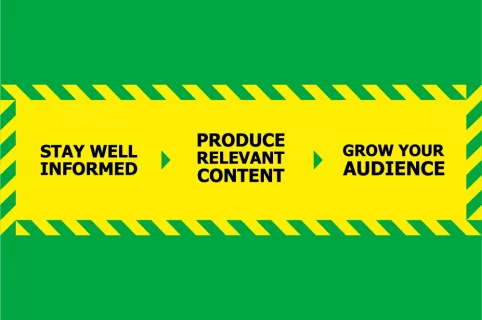
4 mins
OpenContent Marketing In The Time of COVID-19
5 mins
In a mind-bogglingly technical world, a relatable example can be a handy shorthand. Google can be complicated. We break it down with a handy analogy bookworms will love.
19th February 2016

To get the Google Librarian’s attention, the spine of the book must contain some basic information that relates directly to the query…
We love analogies at Go Up. Probably our most popular use of this technique is personifying the enigma that is Google. We know Google isn’t a technically “picking out its favourite site” nor does it intrinsically “know how to select opening times or flight information”. Top sites rank well because they meet the criteria set by a complex set of algorithms. Concert dates or addresses, for example, get pulled into search results because webmasters have added the appropriate schema markup to their sites.
But it’s just a lot more fun exclaiming: “Google, you evil genius!” when it correctly predicts your autosuggest. And so we’re sticking to our analogies. Personifying Google is also useful for explaining some of the basic principles that inform onsite optimisation.
This particular thought exercise has helped guide a lot of our clients (and new team members) through the first steps of making a website “more attractive” to Google.
Picture Google as a friendly, but rigorous and highly competent librarian, and the world wide web as their vast and constantly expanding library. Looking for more information on a particular topic, you (an intrepid researcher) walk up to the front desk and state your request.
Whilst the Google Librarian can, and has, seen most of the books on the shelves (i.e. indexed them in a crawl), there are other signals that will help them make their final decision. As in, when they pluck what they think are the appropriate books to your search query from the shelves.
First, to get the Google Librarian’s attention, the spine of the book must contain some basic information that relates directly to the query, for example: What are the best cycling routes along Belgium’s coast? Thus our Google Librarian is more likely to bring you a book titled, for instance: “Cycling routes on the Flemish Coast” than perhaps the more ambiguously titled: “The Winding Road”.
The online equivalent of this, of course, is meta data. Those are the snippets of text you see for each search result and that you can edit in content management systems (CMS), like WordPress. The title tags and meta descriptions that are used to mark your page content should above all, be descriptive of the subject. If you can add an element of intrigue then that can help encourage clicks (i.e. get the reader to actually open the book) but those volumes need to have grabbed the Google Librarian’s attention first in order to make it to the researcher at all.
 Meta data does on the web what a book’s spine does on a bookshelf. It gives basic information that both describes the book’s content and entices the reader.
Meta data does on the web what a book’s spine does on a bookshelf. It gives basic information that both describes the book’s content and entices the reader.
The Google Librarian is also more likely to select books that are substantial over flimsy-looking pamphlets or shorter guides. To many that might sound counter-intuitive and impractical: “But I only want to get the idiot’s guide not the entire textbook on it!”.
The Google Librarian, however, is one step ahead of you. Not satisfied with serving you just any sort of unreliable drivel (they want you to come back and get more books after all), they prefer more comprehensive content; the thinking being that the more voluminous a book is, the more likely it is to actually answer the researcher’s query.

…often books are on the Google Librarian’s radar because they are referenced by other works on the shelves.
And whilst pamphlets and short introductions are useful, they can miss the mark. More importantly, they don’t instill in the Google Librarian a sense that the author is a true expert on the subject. (Whilst clients are often frustrated by our insistence that we add more quality content to a website, this is precisely why. Quality content, and lots of it, will continue to be a major factor in determining prominence in search.)
The books themselves however, are not enough to convince the Google Librarian to reach for them in response to a researcher’s request. How other researchers have previously interacted with the books also matters – a lot.
To the Google Librarian, clear signs of wear – like cracked spines and faded covers, are proof that a book has delivered for other readers, making it more likely to be chosen again over a book that looks unopened and has gathered dust. Books may be well-used simply because they’re appropriately labelled, comprehensive and attractively designed. But often books are on the Google Librarian’s radar because they are referenced by other works on the shelves.
 Signs of wear indicate that the content is popular.
Signs of wear indicate that the content is popular.
Since these seminal works are often quoted, they are both in high demand with researchers and possess an authority in the field that makes them a popular and reliable response to certain researcher’s queries.
In the real world of Google searches, signs of use equate to low bounce rates and high visitor numbers, and frequent references from other books are the quality backlinks a good SEO company will work so hard to get you. Only websites that provide positive engagement signals and are frequently linked to from other respected websites have a real shot at consistently achieving page one positions in search.
Of course the real Google is not exactly a benevolent librarian, interested only in enriching the world with reliable information. Even well-intentioned librarians have to eat after all!
…the Google Librarian is constantly innovating, finding ways of keeping researchers there even longer.
So the analogy needs a bit of a tweak. Imagine instead, that whilst books can be removed from the library, it’s considered unwieldy and a bit impractical. Instead, researchers are encouraged to take their armful of books to the adjoining cafe where they will pour over them sipping cups of tea and absent-mindedly chewing on (overpriced) scones and baguettes. The cafe, of course, is run by the Google Librarian and all proceeds are greedily stuffed in their own pockets (The library, entirely coincidentally, also happens to be situated in a tax haven. Ka-ching!).
Now, with the stakes higher, the analogy takes on a different tone. Now not only is it in the Google Librarian’s good nature to present researchers with quality, comprehensive results, but it is also crucial to their business model. When researchers are repeatedly shuffling back to the front desk to get new, more, better information, they stay longer and they eat and drink more.
 Google’s business model can be likened to a librarian running the coffee shop in a library that does not encourage taking books home.
Google’s business model can be likened to a librarian running the coffee shop in a library that does not encourage taking books home.
And because they’re enterprising, the Google Librarian is constantly innovating, finding ways of keeping researchers there even longer. Short answers can now be posed to the barista directly for instant results which means researchers have fewer reasons to leave the cafe, and savvy authors can sponsor beverages and print clever quips on sugar packets that will usher researchers directly to their books… The passionate SEO Agency could get quite carried away analogising all of Google’s (evil/genius) mechanisms, but this perhaps is a good place to return to the real world:
Google, like it’s imaginary librarian counterpart, doesn’t get any direct financial reward from search results. It is in selling advertising space alongside the search results that the real winnings are to be had. And they have been substantial. Google’s Pay Per Click (PPC) is its biggest source of revenue, raking in a staggering USD 26.4billion in 2015 alone.